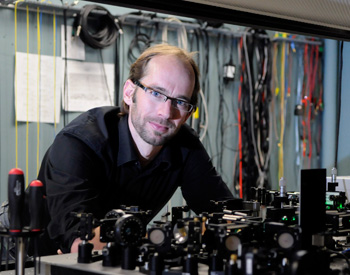Due to non-availability of complete information, majority of the predictions made often go wrong, such as in the case of predicting weather condition.
 Associate professor Wolfgang Tittel and his colleagues have published a paper that suggests nature is next to impossible to predict. (photo by Riley Brandt)
Associate professor Wolfgang Tittel and his colleagues have published a paper that suggests nature is next to impossible to predict. (photo by Riley Brandt)
However in quantum mechanics, it is not possible to perfectly predict the results of certain experiments in advance even if all the related information is available.
This inability to precisely predict the outcomes of quantum physics experiments has been a long-standing debate that discusses whether quantum mechanics is the optimal solution to predict results.
In a paper, ‘An experimental bound on the maximum predictive power of physical theories,’ published in the Physics Review Letters journal, a team of scientists from the Institute for Quantum Information Science of the University of Calgary, the Eidgenössische Technische Hochschule (ETH) and the Perimeter Institute have suggested that quantum theory is near-optimal with respect to its predictive power. Their study explores measurements on members of optimally entangled photon pairs that are directed into Stern-Gerlach-type apparatus where one out of two possible paths can be taken by each photon.
Dr. Wolfgang Tittel, GDC/AITFIndustrial Research Chair in Quantum Cryptography and Communicationat and Associate Professor at University of Calgary, informed that the study demonstrates that any theory in which minimal unpredictability exists is fated to fail. Quantum theory is a platform that describes how predictable the universe is. Unpredictability in quantum theory is one of its major aspects and is broadly acknowledged. Its appeal is its basic characteristic and a variety of implications. Understanding the accurate pattern of the universe at the big bang may not be adequate to envisage its complete evolution, for instance, in contradiction to classical theory.